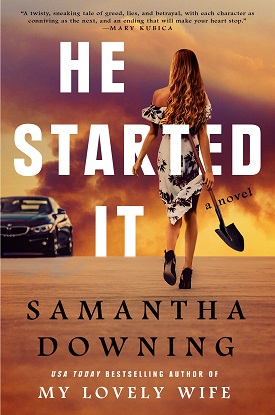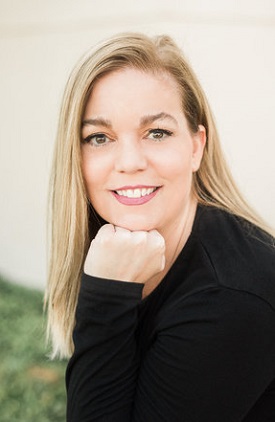 Synopsis:
Synopsis:
He Started It is the story of a family — not unlike your own — just with a few more violent tendencies thrown in. . . .
Beth, Portia, and Eddie Morgan haven’t spent time together for many years. For very good reasons.
But their wealthy grandfather has died. He left a cryptic final message: the three siblings and their respective partners must come together and make a cross-country road trip. They must recreate the road trip they took with their grandfather twenty years ago. It’s his final wish.
More importantly, it’s the requirement their grandfather imposed in order for them to secure their sizable inheritance.
But long, uninterrupted stretches of time with your family members can be tough. Challenging. Draining. For eveyone.
And it’s even harder when you’re all keeping secrets and trying to keep old memories from resurfacing, including a missing person, an act of revenge, the man in the black truck who won’t stop following your car. And especially when at least one of you is a killer and there’s a body in the trunk of your vehicle. Just to name a few reasons.
But money is a powerful motivator. For everyone.
Review:

Samantha Downing’s debut novel, My Lovely Wife, was not a fluke. Full of diabolical, unimaginable plot twists and turns, My Lovely Wife left many readers shocked, amazed, and amused by Downing’s deliciously pernicious imagination.
As it turns out, My Lovely Wife, was just the tip of the crazy iceberg.
Downing’s sophomore effort, He Started It, ramps up the madness. It is a twisted tale not about a married couple locked in a compellingly dysfunctional relationship. Rather, three siblings who went their separate ways many years ago are forced to reunite if they want to claim their respective shares of their grandfather’s estate. Downing says she came up with the idea for the book when a friend of hers told her about a road trip during which everything went wrong. “It just dawned on me that was a perfect setup for a thriller because so many things can happen and you can interact with so many people along the way, so I started thinking about that and came around to the idea of siblings.” Downing is admittedly fascinated by sibling relationships because they are “totally different” from other kinds of relationships. “These are the people you’re with during your formative years, and they’be been through the exact same experiences together.” She wanted to illustrate that “the relationships you have with your siblings stay the same no matter what age you are” so, she explains, the longer her characters are together on the road trip, the more they “revert to their childhood selves.”
There are fourteen days of a hellish road trip remaining when the story opens with a first-person narration from Beth, the middle child. She and her husband, Felix, sit, appropriately enough, in the middle seat of the rented SUV. Her brother, Eddie, two years her senior, drives with his wife, Krista, in the front passenger seat. And Portia, six years younger than Beth, sits alone in the back. She is not married and, according to Beth works as a dancer in Las Vegas. They are transporting their grandfather’s ashes in the trunk. They started the trip in Georgia and are en route to the California coast, stopping along the way at the same places they stopped twenty years ago when they made an identical trip with their grandfather, sharing expenses and two hotel rooms per night — relegating Portia to sharing a room with each couple on a rotating basis to save money.
About their first road trip twenty years ago, Beth relates at the outset that their grandfather “wanted to show us the world, starting with as many states as possible. Instead, it turned into one of those things we don’t mention, don’t talk about. It stays in our heads, swimming around in denial, in disbelief, even in delusion.” She anticipates that the trip upon which they have just embarked will “be the trip of a lifetime. And when it’s over, everything is going to be different. Just like the first time.”
Beth’s narrative is broken up by journal entries from the summer of 1999. They consist of responses to writing prompts set forth in a diary entitled Your Feelings: A Guide — Thoughtful Questions for Thoughtful Girls.
There’s always a missing girl.
As the days count down, Beth describes the group’s journey through several states and the places they stop. Downing says she knew “that this family would not go anywhere normal; they wouldn’t be hanging out at the Grand Canyon.” Indeed. They zigzag their way through Mississippi and into Louisiana where they visit, for instance, a museum dedicated to Bonnie and Clyde that features black-and-white photos of the bank robbers’ bullet-riddled bodies, as well as the men who shot them. The actual car in which they died is on display. Beth’s descriptions of their pilgrimage back to the places their grandfather insisted upon showing them are often darkly hilarious, and she compares the siblings’ current reactions to the ways they responded all those years ago.
The siblings deal with being followed and having their vehicle sabotaged, their grandfather’s ashes going missing, being terrorized when they stop in seedy motels, and trying to figure out each other’s secrets. Beth reveals what transpired during their first trip — the telephone calls home to their parents, the way their grandfather treated them, and the discoveries the siblings made along the way about the real nature of the trip and their grandfather’s motives. The grudge at least one of them held. What they did when they found out the truth — which explains a great deal about what kind of adults the siblings have become. Not to mention what Eddie, Beth, and Portia never brought home from that trip, and how that omission impacted their parents.
For the most part, Beth is a reliable narrator, but Downing makes the most of the points in the story when she is not. She deftly times those moments for maximum impact and, after the first major shocking development, keeps the surprises coming fast. She manages to make Beth empathetic . . . to a point. The story’s initial solid pace quickly accelerates with successive grisly plot twists and revelations, each more surprising than the last. Readers learn each character’s real agenda at the same time as Beth, who plots and schemes to outsmart her siblings when she uncovers the truth.
Alliances are formed and splinter, the siblings betray each other, secrets are revealed. And it all concludes with a pulse-pounding finale that will divide readers. Some will find it brilliant, while others will be completely frustrated by its ambiguity. In Downing’s defense, she says that when she began writing the book, she had only a vague idea of how the story would end. She enjoys not plotting her books and “not knowing what comes next. I discover the story the same way a reader will discover the story.” For the record, she believes the ending is “very clear,” but she is delighted that the conclusion evokes a visceral reaction in readers. She knows the ending is “polarizing, . . . a love-or-hate thing, and I’m okay with that.”
Despite the controversial ending, He Started It is witty, gripping, and will keep readers guessing until — literally — the very end of the story. Downing is quickly establishing herself as a master at creating twisted, fiendish characters and compulsively readable stories filled with wickedly disquieting, but delectable surprises. He Started It is one of the best thrillers of 2020.
Excerpt from He Started It
Part 1
14 DAYS LEFT
You want a heroine. Someone to root for, to identify with. She can’t be perfect, though, because that’ll just make you feel bad about yourself. A flawed heroine, then. Someone who may break the rules to protect her family but doesn’t kill anyone unless it’s self-defense. Not murder, though, at least not the cold-blooded kind. That’s the first deal breaker.
The second is cheating. Men can get away with that and still be the hero, but a cheating wife is unforgivable.
Which means I can’t be your heroine.
I still have a story to tell.
It begins in a car. Rather, an SUV. We sit according to our rank, the oldest in the driver’s seat. That’s Eddie. His wife sits next to him, but I’ll get to her.
The middle seat is for the middle child, and that’s me. Beth. Not Elizabeth, just Beth. I’m two years younger than Eddie and he never lets me forget it. I’m okay to look at, though not as young or thin as I used to be. My husband sits next to me. Again, later for that, because our spouses weren’t supposed to be here.
One seat left, way in the back, and that’s Portia. The surprise baby. She’s six years younger than me and sometimes it feels like a hundred. With no spouse or significant other, she has the whole seat to herself.
In the very back, our luggage. Stacked side by side in a neat single row because that’s the only way it fits. I told Eddie that the first time. Our handbags and computers bags go on top of the roller bags. You don’t have to be a flight attendant to figure that out.
Under the bags, there’s the trunk compartment. One side has the spare tire. In the other, a locked wooden box with brass fittings. This special little box in this special little place, all by itself with nothing else around, is to hold our grandfather. He’s been cremated.
We aren’t talking about him. We aren’t really talking at all. The sun beams through the windows, landing on my leg and making it burn. The A/C dries out my eyes. Eddie plays music that is wordless and jazzy.
I look back at Portia. Her eyes are closed and she has headphones on, probably listening to music that is neither wordless nor jazzy. Her black hair is long and has fallen over one eye. It’s dyed. We all have pale skin, and we were all born with blond hair and either blue or green eyes. My hair is even lighter now because I highlight it. Eddie’s is darker because he doesn’t. Portia’s hair has been black for a while now. It matches her nails. She’s not goth, though. Not anymore.
The music change is abrupt. I didn’t even see Krista move. That’s Eddie’s wife. Krista, the one with olive skin, dark hair, and brown eyes with gold flecks. Krista, the one he married four months after meeting her. She used to be the receptionist at his office.
Pop music blares out of the speakers, a dance song from five years ago. It was bad then, too.
“The jazz was putting me to sleep,” Krista says.
My husband’s eyes flick up from his laptop. He probably didn’t notice the change in music, but he heard Krista’s voice.
Maybe she’s the heroine.
“It’s fine,” Eddie says. I can hear the smile on his face.
I continue to stare out the window. Atlanta is long gone. We aren’t even in Georgia. This is northern Alabama, past Birmingham, where the population is sparse and skeptical. If we were trying to rush, we’d be farther along by now. Rushing isn’t part of the equation.
“Food?”
That’s Portia, her voice groggy from her nap. She’s sitting up, headphones off, wide-eyed like a child.
She’s been milking that baby-of-the-family shit for a long time.
“You want to stop?” Eddie says, turning down the music.
“Let’s stop,” Krista says.
My husband shrugs.
“Yes,” Portia says.
Eddie looks at me in the rearview mirror, like I get a say in the matter. I’m already outnumbered.
“Great,” I say. “Food is great.”
We stop at a place called the Roundabout, which looks just as you imagine. Rustic in a fake way, with the lasso and goat on the sign, but naturally rundown with age. Authentic but not—like most of us.
We all climb out and Portia is first to the door; Krista isn’t far behind. Eddie is the one who takes the most time. He stands outside the car, staring at the back. Hesitating.
It’s our grandfather. This is our first stop of the trip, meaning it’s the first time we have to leave him alone.
“You okay?” I say, tapping Eddie’s arm.
He doesn’t look at me, doesn’t take his eyes off the back of the car because Grandpa’s ashes are everything to us. Not for emotional reasons.
“You want to stay out here? I can bring you a doggie bag,” I say. Sarcasm drips.
Eddie turns to me, his eyes wide. Oh, the shock. Like if I had just told him I was leaving my longtime partner for someone I met two months ago.
Oh wait, he did that. Eddie left his live-in girlfriend for the receptionist.
“I’m fine,” he says. “You don’t have to be so bitchy about it.”
Yes. I’m the villain.
Inside the Roundabout, everyone is sitting in a semicircle booth. It’s twice as big as it needs to be. The seats are wine-colored pleather. Krista and Portia have scooted all the way to the center of the booth, leaving Felix on one side. That’s my husband, Felix, the pale one with the strong jaw and white-blond hair with matching eyebrows and lashes. In a certain light, he disappears.
“No,” Portia says. “There’s nothing vegan.”
She isn’t vegan but checks anyway. Portia also looks for wheelchair access and won’t go in anywhere that doesn’t have it because fairness is important.
“Should we leave?” I say.
No one answers. I sit.
The burgers are chargrilled, the fries are crisp, and the bacon is greasy. A fair deal, if you ask me. The only thing missing is decent coffee, but I drink their bitter version of it without complaint. I can be a good sport.
“We probably should get something settled,” Eddie says. He looks like our father. “We’re going to be driving for a while. A lot of gas, food, and motel rooms. I propose we take turns covering the expenses. More than anything else, let’s not argue about it. The last thing we need to do is fight over a gas bill.”
Before I can say a word, my husband does.
“Makes sense,” Felix says. “Beth and I will pay our fair share.”
Only a spouse can betray you like that. Or a sibling.
That leaves Portia. Given that she’s doesn’t really have a career, the deal isn’t fair.
Oh, the irony.
She yawns. Nods. In Portia-speak, she’s agreeing for now but reserves the right to disagree later.
“Great,” Eddie says. “I’ll get this one.”
He takes the check up to the register, because that’s the kind of place this is. Felix goes to the restroom and Portia steps out front to make a call. That leaves Krista and me, finishing those last sips of lukewarm coffee.
“I know this must be terrible for all of you,” she says, placing her hand on mine. “But I hope we can have some good times, too. I’m sure your grandfather would’ve wanted that.”
It’s a nice enough thing for Krista to say, if a little generic. Given the circumstances, I expect nothing less and nothing more.
Still. If everything falls apart and we all start killing one another, she goes first.
You think I said that for shock value. I didn’t.
No, I’m not a psychopath. That’s always a convenient excuse, though. Someone who has no empathy and has to fake human emotions. Why do they do bad things? Shrug. Who knows? That’s a psychopath for you. Or is it the word sociopath? You know what I’m saying.
This isn’t that kind of story. This is about family. I love my siblings, all of them, I really do. I also hate them. That’s how it goes—love, hate, love, hate, back and forth like a seesaw.
That’s the thing about family. Despite what they say, it’s not a single unit with a single goal. What they never tell us is that, more often than not, every member of the family has their own agenda. I know I do.







Comments are closed.